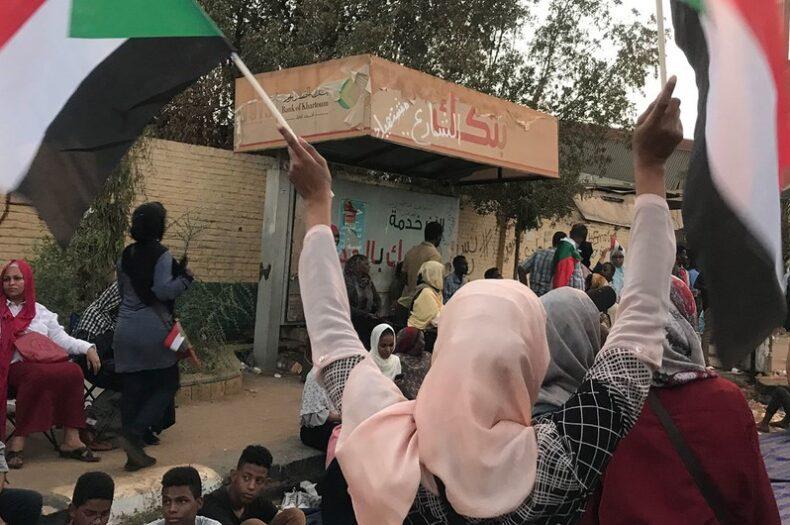Africa-Press – South-Sudan. The waving of the flags and placards, the whistles, and the crowds braving the unforgiving scorching heat to protest have been the notable scenes in Khartoum since Sudan’s Prime Minister Abdalla Hamdok resigned on Sunday.
The protests in Khartoum—which have spread to its periphery—are raising fears of Sudan becoming another Egypt in the aftermath of toppling Hosni Mubarak.
Sources have now revealed that the pro-democracy protesters called for the military government to be “sent back to the barracks where it belongs” as they press on for the full civilian government to take over.
Reports from Aljazeera yesterday showed that security forces had fired tear gas at protesters who were shouting “No, no military rule.” Protests were witnessed in Omdurman, Port Sudan and the capital of South Darfur, Nyala, with protesters burning car tyres and blocking streets, according to AFP News Agency.
Other protesters urged the military “to go back to the barracks”. The report from Mohamed Vall in Omdurman showed protesters “marching calmly and chanting against the military rule”.
The protesters in southern Khartoum and Bahri who tried to march to the presidential palace were reportedly “met with tear gas”. Authorities prevented protesters from accessing government offices.
Vall said that all the bridges were accessible and more so the internet but in the afternoon, security forces were said to have fired bullets.
“Return to barracks”
Firas Faisal, an activist in Khartoum, revealed that the Junta had accepted negotiations, but there were increasing protests.
“Well, I believe that they were very obvious in calling out to negotiate because they have been pressured so much by the protests on the ground. And I think he saw Hamdok’s resignation coming on the way because we, Sudanese people, thought the Hamdok-Junta deal was a way of legitimising the coup that took place on the twenty-fifth of October,” Faisal said in an interview with France 24, The Debate program.
“But we kept on protesting, people kept on fighting and pressuring the Junta (military council), and now the Junta wants to sit down and talk, but that’s not going to happen because of what we can see on the ground now is just an increasing face of protests.”
He said that the dominant party was the Sudanese Resistance Committee, which controlled the protests and the civilian movement and was the right party to hold negotiations with the Junta (Military Council).
He said that there were no divisions in the protests because everyone was convinced that the and the civilian government could not marry each other.
“There are absolutely no divisions now. Everyone is completely convinced that democracy and the Junta cannot coexist in a single regime. “The military belongs to the barracks and that’s where they have to be,” he concluded.
Unable to finish the race
In a discussion on France 24, called The Debate, Kholood Khair of Insight Strategic Partners based in Nairobi said that Hamdok did the right thing to resign since it had reached a point where he could not finish the race.
“I think he did the right thing, I think it became very obvious that he wasn’t able to exercise his roles and his duties within the executive space that he was allowed following the coup. It is pretty clear now that the transitional period ended on the twenty-fifth of October; the day of the coup itself,” Kholood said.
She said that Hamdok’s exit was worth celebrating as the country prepares for what she called a “proper transition.”
“Essentially he was part of the puppet regime that was designed to sanitise what the coup regime had been doing since the twenty-fifth and arguably even before that. And now that the fig leaf is removed, he has enabled a better discussion to take place. The real conversation now is what to do to now to make sure that the military goes back to the barracks and a proper transition can take place.”
UN regrets resignation
According to reports from the website of the United Nations, the UN Secretary-General, António Guterres, on Monday, regretted the whirlwind resignation of Hamdok and urged security forces in Khartoum to refrain from human rights violations during protests.
“In his statement, António Guterres called upon the Sudanese security forces to exercise the utmost restraint and fulfil their obligations in relation to the rights to freedom of assembly and expression,” read the statement on the UN official website.
The UN boss pledged the United Nation’s support towards finding a lasting solution to the political unrest, basically through dialogue.
“Mr Guterres said he regrets that ‘a political understanding on the way forward is not in place, despite the gravity of the situation. Sudanese aspirations for a transition that leads to a democratic dispensation are critical. The UN remains ready to support these efforts,” he said.
The Special Representative of the Secretary-General for Sudan, Volker Perthes, also noted the Prime Minister’s decision to step down.
Call to probe
However, Volker Perthes said he noted and respected the decision of Hamdok.
Perthes commended Hamdok’s achievements during the first phase of the transitional period.
“Mr Perthes is ‘deeply concerned by the number of civilians killed and injured in the ongoing protests. He also urges the security forces to abide by their obligations under international law and strictly uphold the rights of protesters to freedom of expression and peaceful assembly, ” the statement read in part.
He called for the pioneers of injustice and crimes committed against protesters to be urgently brought to book.
“Perpetrators of violence must be brought to justice. The aspirations of the Sudanese people for a democratic path and completing the peace process should be the cornerstone of all efforts to solve the current crisis,” he said.
“The lack of trust among Sudanese actors needs to be overcome through a meaningful and inclusive dialogue,”, he added.
The Special Representative offered that the UN Integrated Transition Assistance Mission in Sudan (UNITAMS) was ready to facilitate the process of seeking justice.
Hamdok resigns
Hamdok resigned on Sunday following mass protests which called for the removal of the military council from the country’s leadership.
Before his reinstatement on November 21, Hamdok was ousted by the Junta, the military council led by Abdel Fattah Al-Burhan after a power-sharing deal. The Sudanese government is currently being run by the military.
Upon his resignation, he warned against “political catastrophe” if a lasting solution is not devised.
He advised a roundtable discussion on the “national charter” and to “draw a roadmap” to transition the country from military to democracy in an election scheduled for July 2023.
“My honourable people, based on all that I have mentioned, I have decided to return your trust to you and announce to you my resignation from the position of prime minister to make way for another one of the sons or daughters of this generous country to lead our dear homeland and carry it through the transition towards a reviving, civil and democratic state,” he added.
The Bureau of African Affairs urged Sudanese leaders to sit down and establish a civilian rule.
“After PM Hamdok’s resignation, Sudanese leaders should set aside differences, find consensus, and ensure continued civilian rule. “Sudan’s next PM and cabinet should be appointed in line with the constitutional declaration to meet the people’s goals of freedom, peace, and justice,” read the tweet from the Bureau of African Affairs.
Abukar Arman, a Somali activist who formerly served as the special envoy to the United States, also said the trouble was brewing after Hamdok’s resignation.
He said that he was yet to believe that Hamdok had indeed, Hamdok’s hands were clean.
“Anyone who listened to Abdel Fattah Al Burhan’s coup speech knew that he was emulating the other Abdel Fattah or Sisi. So, more violence is likely. But don’t count Hamdok out yet. He is to lead one of mini Sudan,” said Arman.
Ahmed El Gaili, a Sudanese lawyer and legal commentator, urged the international community to establish a civilian rule.
“His removal, as for their concern, was to remove the last fig leaf that was covering this regime and what remains are a full-fledged military dictatorship, so, I think the international community will now— arm the military regime, with the hope of heeding the men of the Sudanese reach and installing a full civilian rule,” said Ahmed El Gaili.
In his resignation speech, Hamdok said that the country was at a “dangerous turning point” following his resignation.
“In the past few days, I met all stakeholders of the transitional period, the political and military components and the peace partners, to explain and brief them and to put the national and historical responsibility before them,” the Sudanese Prime Minister said.
“I tried my best to avoid our country slipping into a catastrophe, and now our country is going through a dangerous turning point, that may threaten its entire survival if it is not remedied soon,” Hamdok said.
Burhan speaks
On Saturday, prior to Hamdok’s resignation, during the 66th independence anniversary, Al Burhan warned that Sudan was facing threats and called for dialogue to end the crisis.
“The council commended the efforts made by the security agencies and the wisdom they have shown in dealing with security threats,” said the statement issued by the Sovereignty Council, a collective presidency led by Gen Al Burhan.
For More News And Analysis About South-Sudan Follow Africa-Press






